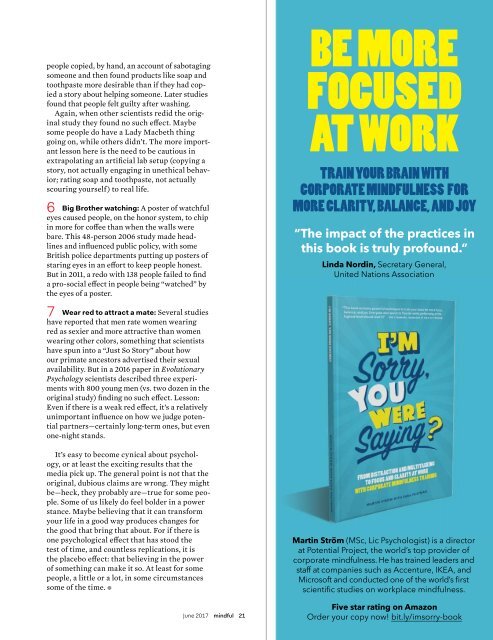Mindful June 2017
Create successful ePaper yourself
Turn your PDF publications into a flip-book with our unique Google optimized e-Paper software.
people copied, by hand, an account of sabotaging<br />
someone and then found products like soap and<br />
toothpaste more desirable than if they had copied<br />
a story about helping someone. Later studies<br />
found that people felt guilty after washing.<br />
Again, when other scientists redid the original<br />
study they found no such effect. Maybe<br />
some people do have a Lady Macbeth thing<br />
going on, while others didn’t. The more important<br />
lesson here is the need to be cautious in<br />
extrapolating an artificial lab setup (copying a<br />
story, not actually engaging in unethical behavior;<br />
rating soap and toothpaste, not actually<br />
scouring yourself) to real life.<br />
6 Big Brother watching: A poster of watchful<br />
eyes caused people, on the honor system, to chip<br />
in more for coffee than when the walls were<br />
bare. This 48-person 2006 study made headlines<br />
and influenced public policy, with some<br />
British police departments putting up posters of<br />
staring eyes in an effort to keep people honest.<br />
But in 2011, a redo with 138 people failed to find<br />
a pro-social effect in people being “watched” by<br />
the eyes of a poster.<br />
BE MORE<br />
FOCUSED<br />
AT WORK<br />
TRAIN YOUR BRAIN WITH<br />
CORPORATE MINDFULNESS FOR<br />
MORE CLARITY, BALANCE, AND JOY<br />
“The impact of the practices in<br />
this book is truly profound.”<br />
Linda Nordin, Secretary General,<br />
United Nations Association<br />
7 Wear red to attract a mate: Several studies<br />
have reported that men rate women wearing<br />
red as sexier and more attractive than women<br />
wearing other colors, something that scientists<br />
have spun into a “Just So Story” about how<br />
our primate ancestors advertised their sexual<br />
availability. But in a 2016 paper in Evolutionary<br />
Psychology scientists described three experiments<br />
with 800 young men (vs. two dozen in the<br />
original study) finding no such effect. Lesson:<br />
Even if there is a weak red effect, it’s a relatively<br />
unimportant influence on how we judge potential<br />
partners—certainly long-term ones, but even<br />
one-night stands.<br />
It’s easy to become cynical about psychology,<br />
or at least the exciting results that the<br />
media pick up. The general point is not that the<br />
original, dubious claims are wrong. They might<br />
be—heck, they probably are—true for some people.<br />
Some of us likely do feel bolder in a power<br />
stance. Maybe believing that it can transform<br />
your life in a good way produces changes for<br />
the good that bring that about. For if there is<br />
one psychological effect that has stood the<br />
test of time, and countless replications, it is<br />
the placebo effect: that believing in the power<br />
of something can make it so. At least for some<br />
people, a little or a lot, in some circumstances<br />
some of the time. ●<br />
<strong>June</strong> <strong>2017</strong> mindful 21<br />
Martin Ström (MSc, Lic Psychologist) is a director<br />
at Potential Project, the world’s top provider of<br />
corporate mindfulness. He has trained leaders and<br />
staff at companies such as Accenture, IKEA, and<br />
<br />
<br />
Five star rating on Amazon<br />
Order your copy now! bit.ly/imsorry-book


